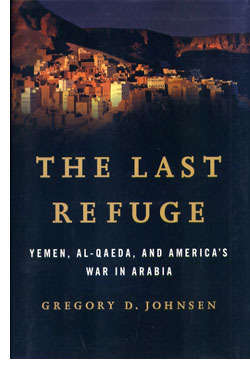 |
 |
 Gregory D. Johnsen
Gregory D. Johnsen
The Last Refuge: Yemen, al-Qaeda, and America's War in Arabia
W. W. Norton & Company
US Hardcover First Edition
ISBN 978-0-393-08242-5
Publication Date: 11-19-2012
352 Pages; $27.95
Date Reviewed: 02-22-2013
Reviewed by: Rick Kleffel © 2013
Index:
Non-Fiction
News reports are often described as stories, but more often than not, they're simply information, data points that are rarely connected. They're easy enough to read, and upon doing so, one can feel informed. In 'The Last Refuge: Yemen, al-Qaeda, and America's War in Arabia,' Gregory D. Johnsen connects news stories that most of us have read or heard or seen reported on television to tell the story of Al Qaeda from its inception to the current day.
Johnsen finds the big story that connects all the news items, and creates character arcs from what might otherwise seem to be a simple series of proclamations, acts of terrorism, attacks and retreats. He finds the stories that didn't make the news, those that enable readers to get a deeper understanding of the major actors in the news and their motivations. 'The Last Refuge' is a timely and timeless tale of war and rebellion, of spies and subterfuge, an action-packed capital-S Story that is much more than mere information. This suspenseful, funny, harrowing, important book builds a world within our world that we think we know until we turn the last page.
If you think of 'The Last Refuge' as a sprawling, intricate spy novel, then you're well on your way to understanding why the book is so compelling to read. After a centuries-hopping introduction, Johnsen takes readers back to the 1980's, when Yemen was a divided country and the Jihad in Afghanistan against the Soviets was an adventure and a proving ground. He treats names from the news with care and creates them as characters. We meet all the major players and get to know them as people, not terrorist threats.
Johnsen's prose is a big player in this book. It's pleasurably easy to read, but offers the sorts of details that nail down the reality of the people and places that he is describing. We never feel like we are reading a policy paper, a news report or being lectured to. Johnsen focuses on human stories and emotions based on intensive research. He creates landscapes and cities with the veracity of one who has traveled the region. He knows how to write in lots of names that are going to be difficult for the Western readers to wrap their brains and tongues around in a manner that makes it easy enough to read.
One of Johnsen's strengths in 'The last Refuge' is his sense of characterization. Both Bin Laden and Salih are exquisitely done, given life and texture that one would never find in the news. There's a large cast here, but the reader is never lost, and there are lots of characters who are offer visions of Al Qaeda and of the wars on the Arabian peninsula that we've not seen before. Hitar, the scholar whose prison education program created the next generation of Al Qaeda is a great example. His hope was to show the Al Qaeda rebels that their understanding of the Koran was wrong, but his aloof superiority made their beliefs even more hard-core.
Johnsen does more than just create great characters. He orchestrates them into character arcs and plots that entwine and unravel, often with an undercurrent of dark humor. You'll learn quite a bit about the incompetence and ineptitude that has plagued Al Qaeda in 'The Last Refuge.' It's sometimes quite funny. But it is equally chilling, as well, especially as Johnsen takes us to the end game, which emphasizes just how real all of these interpersonal relationships are, and how deadly the consequences of our own ineptitude are. Ultimately, we are looking at an organization that is re-energized and much stronger than the individual news stories coming across the wires would like us to believe.
But 'The Last Refuge' itself offers a large does of hope. Because Johnsen lets his readers make sense, lets his readers experience the story in his book, as if it were a particularly complicated work of political intrigue and suspense, the sense of nameless dread is dissipated. Johnsen's book points to the power of naming the thing, of telling the story as a means of getting control of those who are currently acting out that story. It's telling that Johnsen finishes his book without an traditional story ending. As readers, we know by this point that we too, are in the story — and we know, that alas, this story has not yet ended.
|
 |
|
|
 |
| |
Review Archive
All Reviews alphabetized by author.
General Fiction
Non-Genre, general fiction and literature.
Horror
Supernatural fiction, supernatural horror and non-supernatural horror.
Science Fiction
Science fiction, science fantasy, speculative fiction, alternate history.
Fantasy
Fantasy, surrealism and magic realism.
Mystery
Crime, thrillers, mystery, suspense.
Non-Fiction
Non-Fiction, True Crime, Forteana, Reference.
Poetry
|
|
 |
|




